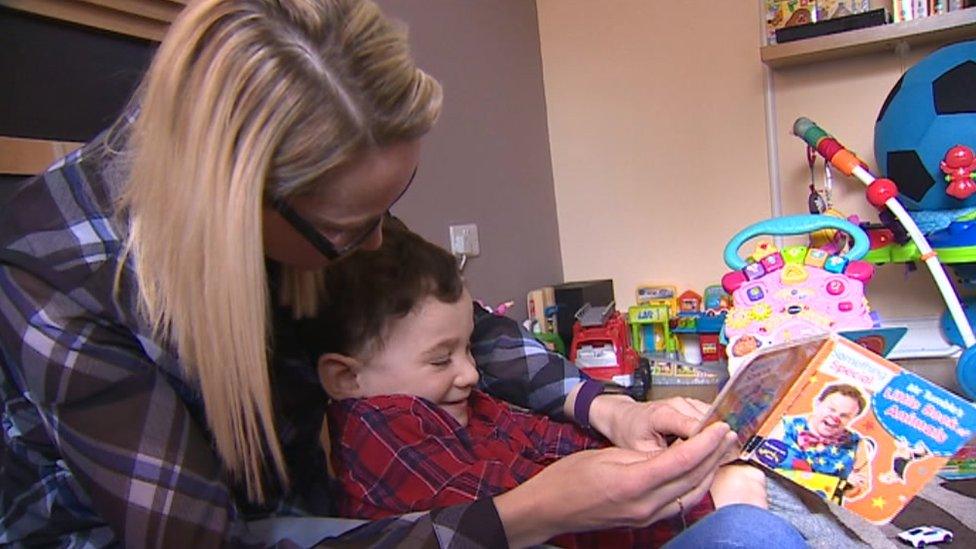Fragile X: The syndrome that causes learning problems
- Published

Helen Buckley said she first noticed something was wrong when Mikie was six months old
Helen Buckley didn't know until her first child was born that she was a carrier of Fragile X syndrome - the most common inherited cause of learning disabilities.
She had inherited it from her mother and passed it on to Mikie.
Developing new treatments for the syndrome is one of two main projects at a new £14m Medicines Discovery Institute in Cardiff.
Ms Buckley said Mikie was not on any medication but may need it in future.
"When he starts to go out into the big wide world and things start to trouble him, that's when a drug might come in handy for him," she said.
Ms Buckley, 33, from Anglesey, first noticed something wasn't right when Mikie was six months old. The condition was confirmed by a blood test.
She still does not know if she has passed the syndrome on to her second child, Rosie.
"There's nothing out there for Fragile X at the moment... If something can help Mikie live a normal or better life in the future then, yes, please do research it more," she said.
The Medicines Discovery Institute, funded by £11m from Cardiff University and £3m from European money, is aimed at developing novel drugs.
The Fragile X research received almost £2.5m, external from the Medical Research Council in November.


What is Fragile X?
The condition affects both boys and girls, although boys are often more severely affected - nearly all boys with the condition will have a learning disability but only a third of girls
It can cause a range of issues with language, emotions, attention, behaviour and social interaction
The severity of the learning disability can vary - but no two people are the same.
Many people with Fragile X might act in a way that is similar to someone with autism, including avoiding eye contact, feeling anxious in social situations, extreme shyness, enjoying familiar routines and hand flapping or hand biting.
Source: Mencap

This research will focus on a protein known to regulate the connections between nerve cells.
It is hoped that by reducing the problems associated with the "hard-wiring" of the brain, the drug will reduce the intellectual disability and autistic behaviours associated with the abnormal connections between nerve cells.
In doing so, it will enable patients to live more independent lives.
A further £3.5m investment from the Medical Research Council will be used for improving anxiety medications.
The team will look for new drugs that do not cause the side effects associated with benzodiazepine drugs.
Prof Simon Ward, director of the Medicines Discovery Institute, said: "Our ultimate aim is to reduce the impact on patients, families and society of mental health and neurodegenerative disorders by translating advances in our disease understanding into new drugs.
"We intend to use our drug discovery capabilities to work with colleagues across Cardiff University to address other unmet medical needs, such as cancer."
- Published14 February 2019

- Published17 March 2019

- Published19 March 2019

- Published30 August 2018
